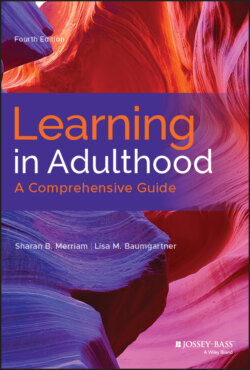Читать книгу Learning in Adulthood - Sharan B. Merriam - Страница 56
There Are Barriers, Not Resistance
ОглавлениеReaders will recall that there is a section of this chapter on barriers to participation. In that section we reviewed the studies that identify personal barriers such as lack of interest, personal problems, thinking one is too old to learn, and so on as well as situational barriers such as lack of time and money. We also pointed out that the individual's motivation, beliefs, and behaviors and life situation explain only part of the picture. Social structural factors such as family of origin, class, race, and so on shape one's level of participation in formal adult education.
What Crowther (2000) is proposing from a critical theory perspective is that nonparticipation can be construed as an act of resistance. Rather than being prevented from participating because of some insurmountable barrier, the learner chooses not to participate—that is, resistance is a matter of deliberate choice. Although resistance has been studied more frequently with secondary school populations, several adult educators have written about this phenomenon, especially in reference to literacy education (Belzer, 2004; Quigley, 1990; Sandlin, 2000).
In summarizing this notion of nonparticipation as resistance rather than barriers, Crowther (2000, pp. 489–490) writes:
It seems reasonable to surmise that many people find adult education unattractive and irrelevant to their daily lives. Despite many well-intentioned efforts to attract people the sense of frustration felt by their failure to respond to what is offered is often evident. It is easy thereafter to assume people are “apathetic” and have limited horizons. Redefining non-participation as a form of resistance may, however, open up the possibility of rethinking what adult education is for and where it occurs. … If we started to think about participation in these terms then the problem of participation could be faced the right way round—that is, that adult education is part of the problem rather than simply the solution.
